Tanzania’s government has closed a critical newspaper for the second time in three months, banning the weekly MwanaHalisi for two years after accusing it of inciting violence.
Another newspaper — Mawio — was banned in June over articles it published linking two former presidents to alleged improprieties in mining deals signed in the 1990s and early 2000s.
The moves appear to cement President John Magufuli’s pledge in January that the days of newspapers his government viewed as unethical “were numbered” — a statement that triggered concerns about censorship.
“The government has suspended publication and circulation of the weekly MwanaHalisi newspaper for 24 months … due to repeated unethical reporting, publishing fabricated and inciting articles and endangering national security,” the state-run Tanzania Information Services said in a statement.
The body said MwanaHalisi published a series of inciteful articles about Magufuli and that its editors had refused to apologise for their reporting.
Magufuli, nicknamed “the bulldozer”, has won some praise from Western donors for an anti-corruption drive and cutting wasteful public spending.
But opponents accuse him of increasingly undermining democracy by curbing dissent and stifling free speech.
Tanzania has one of the most highly diverse media industries in Africa, with over 450 registered newspapers and journals, as well as 180 radio and television stations.
In November, Magufuli signed into law a bill that journalists said was aimed at muzzling freedom of the press.
The Media Services Act of 2016 gives officials powers to shut down media organisations that violate their licenses and requires newspapers to apply for an annual license.
Reuters





